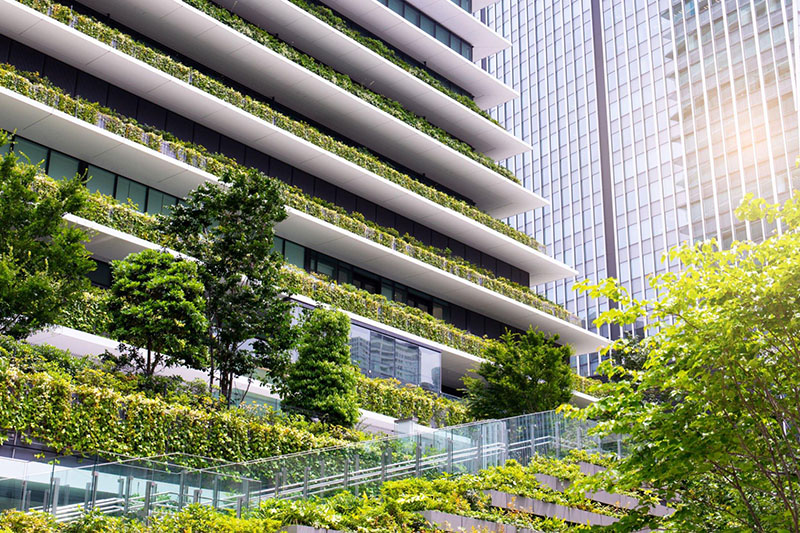Eco-Friendly Building Materials in India: Embracing Sustainable Construction
2.3K
Contents
- Eco-Friendly Building Materials in India: Key Trends
- The Green Building Revolution: Sustainable Construction Practices
- Laying the Foundation: The 7 Principles of Sustainable Construction
- Recycled Concrete for a Solid Foundation
- Sustainable Timber: Preserving Forests
- Energy-Efficient Insulation: Cooling with Less
- Solar Power Integration: Harnessing Renewable Energy
- The Final Word: Building a Sustainable Future with Eco-Friendly Materials
- Frequently Asked Questions
- 1. Are eco-friendly building materials more expensive than conventional options?
- 2. How can builders ensure the quality and reliability of eco-friendly materials?
Sustainable construction practices are gaining momentum in India as the country recognises the urgent need to reduce its environmental footprint. One crucial aspect of sustainable construction is the use of eco-friendly building materials. These materials contribute to preserving natural resources and enhancing the overall energy efficiency and durability of buildings. This article explores some of the top eco-friendly building materials embraced in India's construction industry for a greener and more sustainable future.

Eco-Friendly Building Materials in India: Key Trends
In 2023, India's construction industry prioritises eco-friendly construction materials and sustainable building materials, responding to environmental concerns. Key trends include:
- Sustainable Alternatives: Builders favour sustainable house materials like recycled steel, bamboo, and reclaimed wood for their strength and environmental benefits.
- Energy-Efficient Solutions: Energy-efficient materials like cool roofs and insulation are in demand to reduce energy consumption.
- Green Insulation: Materials such as cellulose and recycled fibreglass are popular for conserving energy and minimising waste.
- Low-Emission Paints: Low-VOC paints enhance indoor air quality by emitting fewer harmful chemicals.
- Solar Power Integration: Solar panels and solar-ready materials are being incorporated into designs for renewable energy.
- Natural Stone: Locally sourced natural stone is used for durability and to reduce transportation impact.
- Water-Efficient Fixtures: Water-saving fixtures, like low-flow toilets and faucets, contribute to water conservation.
The Green Building Revolution: Sustainable Construction Practices
In 2023, India's green building revolution continues to gain momentum with these key elements:
- Holistic Approach: Sustainable construction considers a building's entire lifecycle, reducing environmental impact.
- Optimising Building Performance: Energy efficiency is prioritised with LED lighting, smart thermostats, and energy-efficient HVAC systems.
- Human-Centric Design: Indoor air quality, natural lighting, and ergonomic design create healthier environments.
- Sustainable Certifications: Green building certifications like LEED and GRIHA recognise sustainable practices.
- Material Innovation: Continuous research leads to new eco-friendly construction materials and technologies.
- Waste Reduction: Efficient resource utilisation, recycling, and material reuse minimise waste.
- Environmental Stewardship: The green building techniques balances construction with conservation using environmentally friendly house-building materials.
Laying the Foundation: The 7 Principles of Sustainable Construction
- Minimising Resource Consumption: Efficient resource management and waste reduction are key.
- Maximising Resource Reuse: Reuse of materials reduces demand for new resources.
- Using Renewable or Recyclable Resources: Prioritising renewable and recyclable materials.
- Protecting the Environment: Minimising environmental impact during construction.
- Creating a Healthy Environment: Enhancing human health through indoor air quality and comfort.
- Ensuring Quality and Durability: Long-lasting buildings reduce the need for new construction.
- Future-Proofing: Designing for adaptability to future changes, ensuring sustainability.
Recycled Concrete for a Solid Foundation
Recycled concrete is a highly sustainable building material that is gaining popularity across India. It is produced by crushing and reusing concrete waste from demolished structures, reducing the need for new aggregates and landfill space. In addition, by utilising recycled concrete, construction projects can significantly minimise carbon emissions and conserve natural resources while maintaining structural integrity.
Sustainable Timber: Preserving Forests
Traditional timber harvesting practices often lead to deforestation and habitat destruction. However, sustainable timber alternatives, such as bamboo and engineered wood, offer environmentally conscious solutions. Bamboo, a rapidly renewable resource, has excellent strength-to-weight ratio properties and can be used for various construction applications. Engineered wood, produced from fast-growing plantation trees, provides a viable alternative to traditional hardwood while reducing pressure on forests.
Energy-Efficient Insulation: Cooling with Less
Energy-efficient insulation is vital in sustainable construction in a tropical country like India, where cooling needs are substantial. Materials like expanded polystyrene (EPS) and cellulose insulation are known for their excellent thermal performance, reducing the energy required for cooling buildings. As a result, these insulation materials help lower carbon emissions and promote energy efficiency by minimising heat transfer and optimising energy consumption.
Solar Power Integration: Harnessing Renewable Energy
Integrating solar power systems into building designs is an increasingly popular choice in sustainable construction. Solar panels generate clean and renewable energy and help reduce reliance on fossil fuels. By embracing solar energy, buildings can offset their carbon footprint and contribute to a greener grid. This eco-friendly solution aligns with India's ambitious renewable energy goals and encourages a sustainable approach to power generation
The Final Word: Building a Sustainable Future with Eco-Friendly Materials
Adopting eco-friendly building materials is crucial for construction in India's sustainable development journey. Using recycled concrete, sustainable timber, energy-efficient insulation, and solar power integration reduces environmental impact and promotes energy efficiency, durability, and occupant well-being. Embracing sustainable construction practices benefits the environment and secures India's resilient and prosperous future.
Frequently Asked Questions
1. Are eco-friendly building materials more expensive than conventional options?
Ans: While some eco-friendly materials may cost more initially, they offer long-term savings through reduced energy consumption and maintenance. Hence, increasing demand for eco-friendly materials may lead to more competitive pricing.
2. How can builders ensure the quality and reliability of eco-friendly materials?
Ans: Builders should choose reputable suppliers adhering to recognised standards and certifications for eco-friendly products. Verify manufacturers' claims about the environmental credentials of their materials. Consulting professionals and conducting thorough research aid in selecting high-quality eco-friendly building materials.

